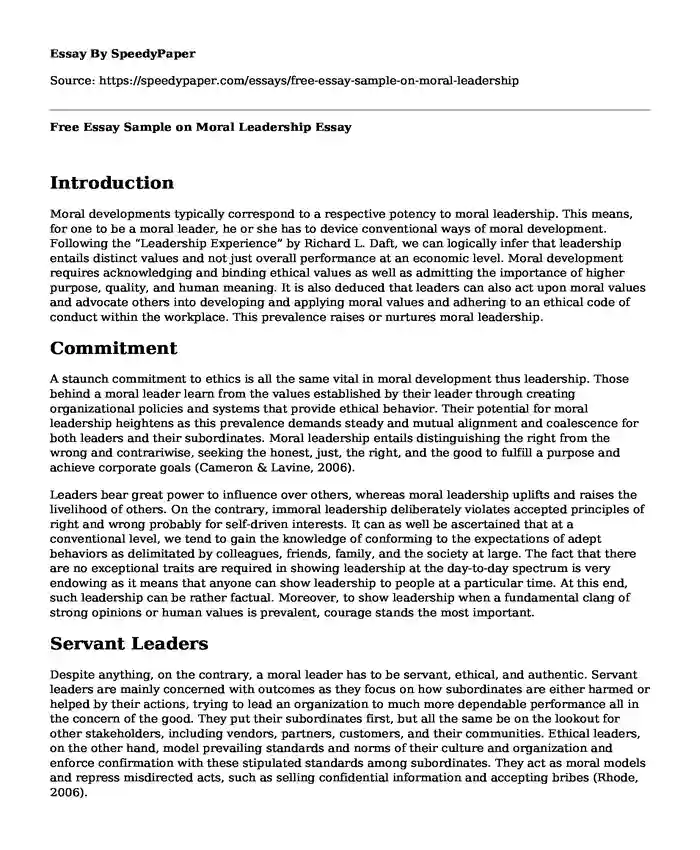
| Type of paper: | Essay |
| Categories: | Ethics Leadership development Moral development |
| Pages: | 3 |
| Wordcount: | 593 words |
Introduction
Moral developments typically correspond to a respective potency to moral leadership. This means, for one to be a moral leader, he or she has to device conventional ways of moral development. Following the “Leadership Experience” by Richard L. Daft, we can logically infer that leadership entails distinct values and not just overall performance at an economic level. Moral development requires acknowledging and binding ethical values as well as admitting the importance of higher purpose, quality, and human meaning. It is also deduced that leaders can also act upon moral values and advocate others into developing and applying moral values and adhering to an ethical code of conduct within the workplace. This prevalence raises or nurtures moral leadership.
Commitment
A staunch commitment to ethics is all the same vital in moral development thus leadership. Those behind a moral leader learn from the values established by their leader through creating organizational policies and systems that provide ethical behavior. Their potential for moral leadership heightens as this prevalence demands steady and mutual alignment and coalescence for both leaders and their subordinates. Moral leadership entails distinguishing the right from the wrong and contrariwise, seeking the honest, just, the right, and the good to fulfill a purpose and achieve corporate goals (Cameron & Lavine, 2006).
Leaders bear great power to influence over others, whereas moral leadership uplifts and raises the livelihood of others. On the contrary, immoral leadership deliberately violates accepted principles of right and wrong probably for self-driven interests. It can as well be ascertained that at a conventional level, we tend to gain the knowledge of conforming to the expectations of adept behaviors as delimitated by colleagues, friends, family, and the society at large. The fact that there are no exceptional traits are required in showing leadership at the day-to-day spectrum is very endowing as it means that anyone can show leadership to people at a particular time. At this end, such leadership can be rather factual. Moreover, to show leadership when a fundamental clang of strong opinions or human values is prevalent, courage stands the most important.
Servant Leaders
Despite anything, on the contrary, a moral leader has to be servant, ethical, and authentic. Servant leaders are mainly concerned with outcomes as they focus on how subordinates are either harmed or helped by their actions, trying to lead an organization to much more dependable performance all in the concern of the good. They put their subordinates first, but all the same be on the lookout for other stakeholders, including vendors, partners, customers, and their communities. Ethical leaders, on the other hand, model prevailing standards and norms of their culture and organization and enforce confirmation with these stipulated standards among subordinates. They act as moral models and repress misdirected acts, such as selling confidential information and accepting bribes (Rhode, 2006).
Conclusion
Authentic leaders are fair, wise, and honest. They are highly aware of themselves, understanding their weaknesses as well as strengths, and strive to nurture their subordinates and help them know and comprehend themselves. Authentic leaders make decisions that correspond to their moral compass, as opposed to other people’s notions of ethics. Moral leaders may deem it effective to employ different configurations of moral leadership across diverse situations, as their needs dictate. From that fact, the potential for moral leadership is irrefutable as far as moral development is concerned.
References
Cameron, K., & Lavine, M. (2006). Making the Impossible Possible: Leading Extraordinary Performance - the Rocky Flats Story.
Rhode, D. L. (2006). Moral leadership: The theory and practice of power, judgment, and policy. San Francisco, Calif: Jossey-Bass.
Cite this page
Free Essay Sample on Moral Leadership. (2023, Nov 25). Retrieved from https://speedypaper.com/essays/free-essay-sample-on-moral-leadership
Request Removal
If you are the original author of this essay and no longer wish to have it published on the SpeedyPaper website, please click below to request its removal:
- Essay Sample on How Great Leaders Inspire Action
- Free Essay. Self-Advocacy and Communication with Family
- Free Essay. Relationship Between Academic Integrity and Writing
- Free Essay about Implementing Servant Leadership in Cleveland Clinic
- Paper Example. Critique of Hand Hygiene
- Paper Example: Ways of Developing Confidence in the Teaching Profession
- Essay Sample on Ethical Case Analysis Paper
Popular categories




